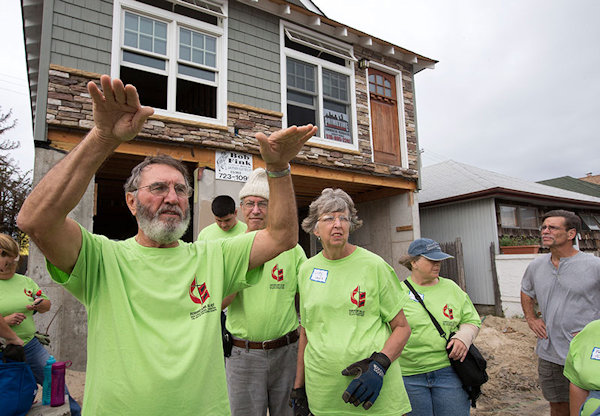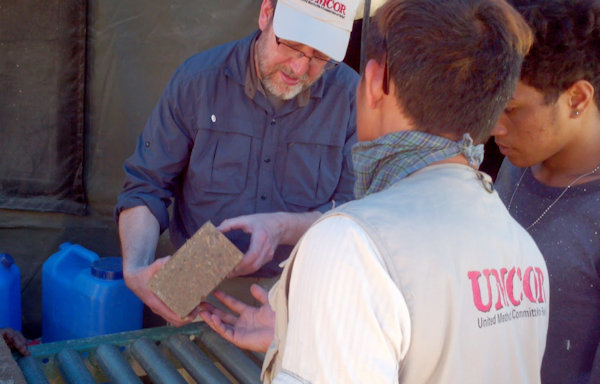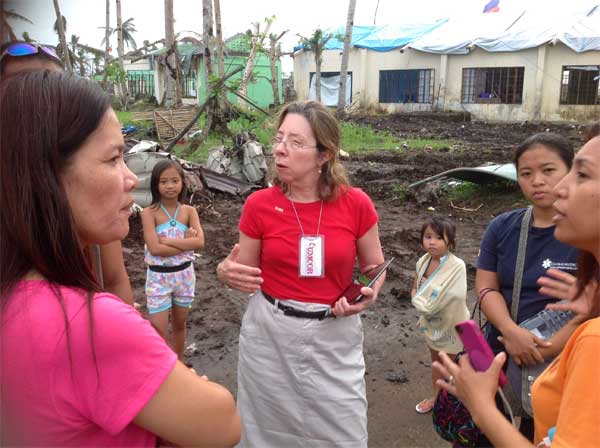The United Methodist Committee on Relief moves into a future connecting neighbor with neighbor for fullness of life.
LINDA UNGER
General Bd of Global Ministries
New York, N.Y., March 22, 2016—Over the past four years, the United Methodist Committee on Relief (UMCOR) has tripled its response to disasters large and small around the world, Deputy General Secretary Denise Honeycutt told UMCOR’s board of directors during their final meeting of the current United Methodist quadrennium.
“Internationally, we tripled the number of disaster-response grants,” Honeycutt explained. “We have attempted to vigorously respond to disasters, even under-reported disasters, wherever and whenever they occur.”
During the four-year period initiated by General Conference 2012 and ending ahead of General Conference 2016, UMCOR, part of the General Board of Global Ministries, also sought to spend down longstanding Advance balances, “getting more needed assistance to more people in times of great crisis,” Honeycutt said.
In her report to the directors on March 17, she underscored some of the complex disasters for which UMCOR supplied humanitarian aid, including Super Typhoon Haiyan in the Philippines in 2013, the Ebola crisis in West Africa and massive flooding in Pakistan and India in 2014, and the ongoing conflicts in Syria and Iraq.
Bishop Hee-Soo Jung of Wisconsin, president of the UMCOR board, reported on his recent trip to the Philippines, where Typhoon Haiyan survivors celebrated the completed construction of five community emergency evacuation shelters and 134 homes, all built with support from UMCOR.
He said he witnessed both deep sorrow and joy in the survivors, who, though they lost so much in the disaster, now have these “lifesaving places.” He referred to the experience paraphrasing Oscar Romero, the slain archbishop of El Salvador, saying, “When we are close to the poor, we experience conversion.”
During the meeting, the directors approved a new grant for $1 million to rebuild homes and provide integrated development support—water, livelihoods, and food security—for 130 families in the communities of Ganthier and Boen in Haiti, as that country continues to recover from the devastating 2010 earthquake. The grant will be implemented by longtime partner Church World Service.
UMCOR has worked in these communities since the disaster, and the new grant will build on that experience.
U.S. Disaster Response
In the United States, Honeycutt reported, UMCOR provided $12 million in disaster-relief aid during the quadrennium, plus an additional $10 million in response to Super Storm Sandy, which in 2012 devastated parts of the East Coast.
The variety of disasters UMCOR responded to in the U.S., Honeycutt said, “sounds like a terrible trailer for some ‘disaster movie.’” They included a chemical spill in West Virginia; toxic drinking water in Flint, Mich.; civil unrest in Baltimore, Md.; and a fertilizer plant explosion in West, Texas; as well as wildfires, floods, mudslides, tornadoes, and earthquakes.
UMCOR supported church responses to the 2014 influx of unaccompanied minors to the U.S. and collaborated with National Justice for Our Neighbors, an immigrant advocacy network, to offer welcome, care, and legal services, “extending the loving presence of Jesus Christ through our actions,” she said.
The directors approved another grant during the meeting, in the amount of $900,000, for the South Carolina Conference. It will assist families and individuals impacted by record flooding in that state last fall. The board already had approved a $100,000 bridge grant for the conference in the early days of the disaster.
Greg Forrester, who leads UMCOR U.S. Disaster Response and had just returned from South Carolina the morning of the board meeting, reported that the initial grant allowed the conference to begin to set up a long-term response, including staff on the ground in three locations. “We’re the only ones who are already up and running,” he said.

Water and food
In its International Programs area, UMCOR leveraged $21 million in donations to provide $78 million in development assistance from agencies and through in-kind commodities destined for “the most vulnerable individuals and communities,” with a particular focus on water, sanitation, and hygiene projects, as well as sustainable agriculture and food security, Honeycutt reported.
She noted that UMCOR began the quadrennium with 10 field missions, UMCOR country offices that provide long-term responses to disasters and employ staff mainly from the affected countries. Over the past four years, UMCOR closed five of those missions—Indonesia, Sri Lanka, Georgia, Armenia, and Afghanistan—having completed each mandate or found it otherwise expedient to do so.
Looking to the future
After General Conference 2016 concludes toward the end of May, a new board will be formed, so this was the last meeting of the current group of directors. It also was the last meeting for Denise Honeycutt at UMCOR’s helm, as she will be taking on a new role as the executive director of Global Ministries’ new Center for Mission Innovation.
“I am very excited about this new role and what a bold move it is for Global Ministries to create this forward-thinking, forward-leaning unit, providing for the church a best-practice learning and innovation ‘laboratory’ for re-envisioning and redefining 21st-century mission practice,” she said.
“Nevertheless, she added, “UMCOR’s work would continue to move forward in the strong and steady way it has over the last 75 years, alleviating human suffering and offering hope and healing in Jesus’ name.”
UMCOR priorities
A priority for International Disaster Response will be to expand its work in disaster risk reduction (DRR). Rev. Jack Amick, who leads the unit and had traveled with Bishop Jung to the Philippines, said that visit made him feel “more certain than ever that we need to invest in DRR.”
As part of the ceremonies in the areas impacted by Typhoon Haiyan, little children laid roses for each of those who died in the disaster, while the names of the fallen were read. “It was a sorrowful, painful moment,” Amick said. “The pile of roses was just too large.”
DRR is a process that seeks to reduce the propensity for disaster, he explained. UMCOR will continue to pursue this work by supporting communities with training and disaster planning, creating early warning systems, and identifying and implementing mitigation efforts.

With regard to disasters in the U.S., Greg Forrester noted that UMCOR had responded to 57 new disasters in 36 states in 2015—more than one a week. Nevertheless, he said, “Our response role has to increase.”
The best way to do that, he said, is to build the capacity of local churches to respond by providing training in disaster preparedness and disaster case management. “We can respond faster if we put disaster case management into place faster,” he said.
For that, Forrester noted, UMCOR has revised its disaster preparedness curriculum, Connecting Neighbors, and will continue to roll it out to congregations and conference leaders.
In the development field, Javed Sheikh, interim director of International Programs, noted two cutting-edge challenges. He said UMCOR would focus its development work in relationship to Global Ministries’ new regional offices and continue to build effectiveness by collaborating with other international agencies and local churches
Last Updated on December 15, 2023

